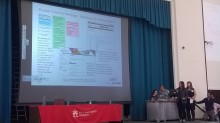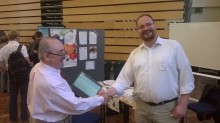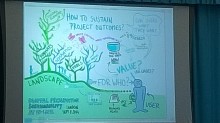|
Digital meets Culture https://www.digitalmeetsculture.net/article/digital-preservation-sustainability-on-the-eu-policy-level/ Export date: Mon Mar 31 22:50:33 2025 / +0000 GMT |
Digital preservation sustainability on the EU policy level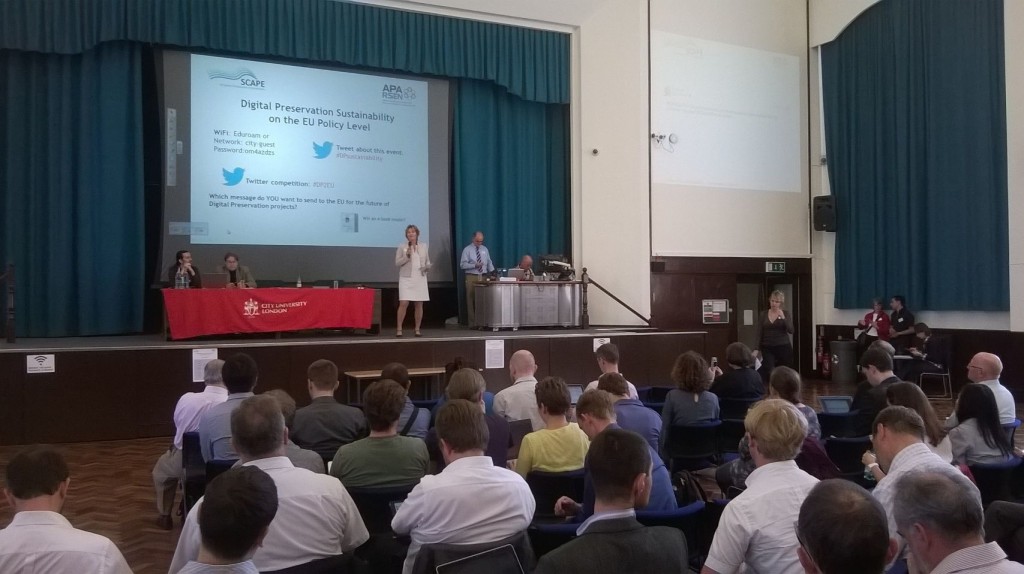 “Digital preservation sustainability on the EU policy level” is the title of the workshop co-organised by the FP7 projects SCAPE and APARSEN on 8th September 2014 at the City University in London in the frame of the DL 2014 Conference. The event brought together various EU projects/initiatives, among which DCH-RP, to present their solutions and approaches, and to find synergies between them. Aim of the workshop was to provide an overview of solutions to challenges within Digital Preservation Sustainability developed by current and past Digital Preservation research projects. Decision makers, managers, researcher, practitioners, librarians, publishers, developers and data managers attended the workshop to learn which are the latest outcomes and the future opportunities offered by the European Union. The workshop consisted of two parts: 1) a panel discussion, and 2) a clinic. In the opening panel session three experts from SCAPE, APARSEN and OPF discussed the current status of Digital Preservation Sustainability on EU policy level. The aim of the panel discussion was to present, discuss, and evaluate main results of the projects and initiatives and how these will be sustained after the end of the projects. The attendees had the opportunity to bring in their own questions related to Sustainability and Digital Preservation. 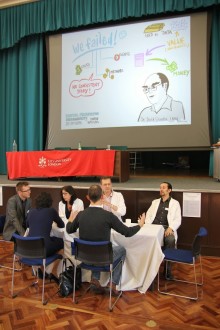 After the panel discussion the attendees visited stalls run by invited Digital Preservation projects, where they can got information about the projects. Each project/initiative run a stall and presented their view on Digital Preservation sustainability in their particular field. In this “clinic” the projects / initiatives acted as ‘doctors', so the visiting audience discussed their preservation issues and got advice from experts. After the panel discussion the attendees visited stalls run by invited Digital Preservation projects, where they can got information about the projects. Each project/initiative run a stall and presented their view on Digital Preservation sustainability in their particular field. In this “clinic” the projects / initiatives acted as ‘doctors', so the visiting audience discussed their preservation issues and got advice from experts.Programme and presentations 13:00-14:40 Panel Session (moderator: Hildelies Balk, Head of the section European Projects for Research and Development, National Library of the Netherlands, and involved in both APARSEN and SCAPE, NL) - 13:00-13:15 APARSEN (Dr. David Giaretta, Director of Alliance for Permanent Access, UK): download PDF - 13:15-13:30 SCAPE (Dr. Ross King, Project Coordinator for SCAPE, AT): download PDF - 13:30-13:45 OPF (Ed Fay, Director of Open Planets Foundation, UK): download PDF - 13:45-14:30 Panel discussion - 14:30-14:40 Wrap up and Conclusions 14:00-16:45 Clinic Session (all projects involved) - 14:40-14:55 Elevator Pitches: download PDF - 14:55-15:00 Short break - 15:00-16:45 Projects' stalls and clinic table (Experts answering questions on specific topics) 16:45-17:00 Closing Remarks (Hildelies Balk) Projects in the Clinic 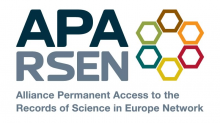 APARSEN. APARSEN is a Network of Excellence that brings together an extremely diverse set of practitioner organisations and researchers in order to bring coherence, cohesion and continuity to research into barriers to the long-term accessibility and usability of digital information and data, exploiting our diversity by building a long-lived Virtual Centre of Digital Preservation Excellence. The objective of this project may be simply stated, namely to look across the excellent work in digital preservation which is carried out in Europe and to try to bring it together under a common vision. More information: http://www.alliancepermanentaccess.org/index.php/aparsen/ APARSEN. APARSEN is a Network of Excellence that brings together an extremely diverse set of practitioner organisations and researchers in order to bring coherence, cohesion and continuity to research into barriers to the long-term accessibility and usability of digital information and data, exploiting our diversity by building a long-lived Virtual Centre of Digital Preservation Excellence. The objective of this project may be simply stated, namely to look across the excellent work in digital preservation which is carried out in Europe and to try to bring it together under a common vision. More information: http://www.alliancepermanentaccess.org/index.php/aparsen/ SCAPE. The SCAPE project develops scalable services for planning and execution of institutional preservation strategies on an open source platform that orchestrates semi-automated workflows for large-scale, heterogeneous collections of complex digital objects. SCAPE enhances the state of the art of digital preservation in three ways: by developing infrastructure and tools for scalable preservation actions; by providing a framework for automated, quality-assured preservation workflows, and by integrating these components with a policy-based preservation planning and watch system. These concrete project results are being validated within three large-scale Testbeds from diverse application areas. More information: http://www.scape-project.eu/ SCAPE. The SCAPE project develops scalable services for planning and execution of institutional preservation strategies on an open source platform that orchestrates semi-automated workflows for large-scale, heterogeneous collections of complex digital objects. SCAPE enhances the state of the art of digital preservation in three ways: by developing infrastructure and tools for scalable preservation actions; by providing a framework for automated, quality-assured preservation workflows, and by integrating these components with a policy-based preservation planning and watch system. These concrete project results are being validated within three large-scale Testbeds from diverse application areas. More information: http://www.scape-project.eu/ DPC. The Digital Preservation Coalition is an advocate and catalyst for digital preservation, with a vision of making our digital memory accessible tomorrow. Our target audience is varied: people who want to learn more about digital preservation; those already involved in digital preservation; and members of organisations which may be interested in discovering more about our research and advocacy. We can provide introductory information to participants, and advise on many issues relating to digital preservation. More information: http://www.dpconline.org/ DPC. The Digital Preservation Coalition is an advocate and catalyst for digital preservation, with a vision of making our digital memory accessible tomorrow. Our target audience is varied: people who want to learn more about digital preservation; those already involved in digital preservation; and members of organisations which may be interested in discovering more about our research and advocacy. We can provide introductory information to participants, and advise on many issues relating to digital preservation. More information: http://www.dpconline.org/ TIMBUS. The EU co-funded TIMBUS project addresses the challenge of digital preservation of business processes and services to ensure their long-term continued access. While the project focuses on industrial institutions, our services will feed back to the processes in memory institutions. Our target audience for this workshop is people with a particular interest in exploring the benefits of process preservation for their business. We can introduce them to the TIMBUS approach to process preservation and give advice on where they can find more information about process preservation including planning, risk management and legal aspects. More information: http://timbusproject.net/ TIMBUS. The EU co-funded TIMBUS project addresses the challenge of digital preservation of business processes and services to ensure their long-term continued access. While the project focuses on industrial institutions, our services will feed back to the processes in memory institutions. Our target audience for this workshop is people with a particular interest in exploring the benefits of process preservation for their business. We can introduce them to the TIMBUS approach to process preservation and give advice on where they can find more information about process preservation including planning, risk management and legal aspects. More information: http://timbusproject.net/ ForgetIT. While preservation of digital content is now well established in memory institutions such as national libraries and archives, it is still in its infancy in most other organizations, and even more so for personal content. ForgetIT combines three new concepts to ease the adoption of preservation in the personal and organizational context. More information: http://www.forgetit-project.eu/ ForgetIT. While preservation of digital content is now well established in memory institutions such as national libraries and archives, it is still in its infancy in most other organizations, and even more so for personal content. ForgetIT combines three new concepts to ease the adoption of preservation in the personal and organizational context. More information: http://www.forgetit-project.eu/ DURAARK. DURAARK is developing methods and tools for the Long-Term Preservation (LTP) of architectural knowledge, including approaches to enrich Building Information Models with “as built” information from scans, semantically enrich building models with additional data sets and preserve 3D models for future reuse. More information: http://duraark.eu/ DURAARK. DURAARK is developing methods and tools for the Long-Term Preservation (LTP) of architectural knowledge, including approaches to enrich Building Information Models with “as built” information from scans, semantically enrich building models with additional data sets and preserve 3D models for future reuse. More information: http://duraark.eu/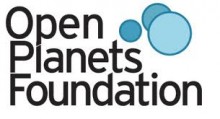 OPF. The Open Planets Foundation (OPF) addresses core digital preservation challenges by engaging with its members and the community to develop practical and sustainable tools and services to ensure long-term access to digital content. More information: http://www.openplanetsfoundation.org/ OPF. The Open Planets Foundation (OPF) addresses core digital preservation challenges by engaging with its members and the community to develop practical and sustainable tools and services to ensure long-term access to digital content. More information: http://www.openplanetsfoundation.org/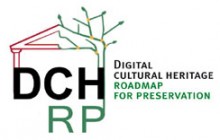 DCH-RP. DCH-RP project (Digital Cultural Heritage Roadmap for Preservation) is a Coordination Action supported by the European Commission under the FP7 e-Infrastructure Capacities Programme, to design a Roadmap for the implementation of a federated e-Infrastructure for the long-term preservation of DCH content. The Roadmap will be supplemented by practical tools for decision makers and validated through a range of proofs of concept, where cultural institutions and e-Infrastructure providers work together on concrete experiments. More information: http://www.dch-rp.eu/ DCH-RP. DCH-RP project (Digital Cultural Heritage Roadmap for Preservation) is a Coordination Action supported by the European Commission under the FP7 e-Infrastructure Capacities Programme, to design a Roadmap for the implementation of a federated e-Infrastructure for the long-term preservation of DCH content. The Roadmap will be supplemented by practical tools for decision makers and validated through a range of proofs of concept, where cultural institutions and e-Infrastructure providers work together on concrete experiments. More information: http://www.dch-rp.eu/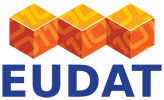 EUDAT. EUDAT is laying the foundations for a European Collaborative Data Infrastructure. EUDAT takes a service-oriented approach to federating existing European research data repositories, paving the way for common approaches to data sharing, data archiving, data finding and data re-use for European research. More information: http://www.eudat.eu/ EUDAT. EUDAT is laying the foundations for a European Collaborative Data Infrastructure. EUDAT takes a service-oriented approach to federating existing European research data repositories, paving the way for common approaches to data sharing, data archiving, data finding and data re-use for European research. More information: http://www.eudat.eu/
|
